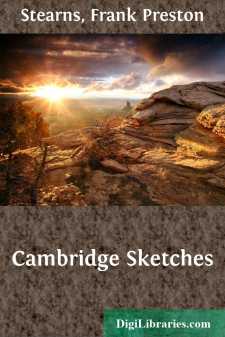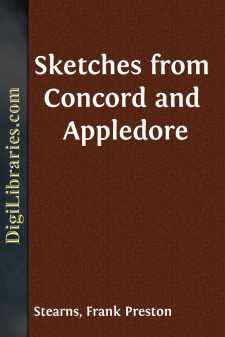Categories
- Antiques & Collectibles 13
- Architecture 36
- Art 48
- Bibles 22
- Biography & Autobiography 813
- Body, Mind & Spirit 142
- Business & Economics 28
- Children's Books 17
- Children's Fiction 14
- Computers 4
- Cooking 94
- Crafts & Hobbies 4
- Drama 346
- Education 46
- Family & Relationships 57
- Fiction 11829
- Games 19
- Gardening 17
- Health & Fitness 34
- History 1377
- House & Home 1
- Humor 147
- Juvenile Fiction 1873
- Juvenile Nonfiction 202
- Language Arts & Disciplines 88
- Law 16
- Literary Collections 686
- Literary Criticism 179
- Mathematics 13
- Medical 41
- Music 40
- Nature 179
- Non-Classifiable 1768
- Performing Arts 7
- Periodicals 1453
- Philosophy 64
- Photography 2
- Poetry 896
- Political Science 203
- Psychology 42
- Reference 154
- Religion 513
- Science 126
- Self-Help 84
- Social Science 81
- Sports & Recreation 34
- Study Aids 3
- Technology & Engineering 59
- Transportation 23
- Travel 463
- True Crime 29
Cambridge Sketches
Description:
Excerpt
THE CLOSE OF THE WAR
Never before hast thou shone
So beautifully upon the Thebans;
O, eye of golden day:
—Antigone of Sophocles.
One bright morning in April, 1865, Hawthorne's son and the writer were coming forth together from the further door-way of Stoughton Hall at Harvard College, when, as the last reverberations of the prayer-bell were sounding, a classmate called to us across the yard: "General Lee has surrendered!" There was a busy hum of voices where the three converging lines of students met in front of Appleton Chapel, and when we entered the building there was President Hill seated in the recess between the two pulpits, and old Doctor Peabody at his desk, with his face beaming like that of a saint in an old religious painting. His prayer was exceptionally fervid and serious. He asked a blessing on the American people; on all those who had suffered from the war; on the government of the United States; and on our defeated enemies. When the short service had ended, Doctor Hill came forward and said: "It is not fitting that any college tasks or exercises should take place until another sun has arisen after this glorious morning. Let us all celebrate this fortunate event."
On leaving the chapel we found that Flavius Josephus Cook, afterwards Rev. Joseph Cook of the Monday Lectureship, had collected the members of the Christian Brethren about him, and they were all singing a hymn of thanksgiving in a very vigorous manner.
There were some, however, who recollected on their way to breakfast the sad procession that had passed through the college-yard six months before,—the military funeral of James Russell Lowell's nephews, killed in General Sheridan's victory at Cedar Run. There were no recent graduates of Harvard more universally beloved than Charles and James Lowell; and none of whom better things were expected. To Lowell himself, who had no other children, except a daughter, they were almost like his own sons, and the ode he wrote on this occasion touches a depth of pathos not to be met with elsewhere in his poetry. There was not at that time another family in Cambridge or Boston which contained two such bright intellects, two such fine characters. It did not seem right that they should both have left their mother, who was bereaved already by a faithless husband, to fight the battles of their country, however much they were needed for this. Even in the most despotic period of European history the only son of a widow was exempt from conscription. Then to lose them both in a single day! Mrs. Lowell became the saint of Quincy Street, and none were so hardened or self-absorbed as not to do her reverence.
But now the terrible past was eclipsed by the joy and pride of victory. The great heroic struggle was over; young men could look forward to the practice of peaceable professions, and old men had no longer to think of the exhausting drain upon their resources. Fond mothers could now count upon the survival of their sons, and young wives no longer feared to become widows in a night....




